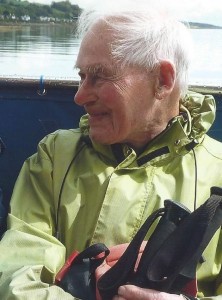Support us from £3/month
We deal with almost 1000 cases a year assisting communities, groups and individuals in protecting their local spaces and paths in all parts of England and Wales. Can you help us by joining as a member?
We remember Richard Harland, our former vice-chairman who died aged 93 last November, and who made a quiet but significant contribution to commons and access.
Richard Harland was a Quaker, a pacifist and campaigner, who loved beautiful landscapes and their history, and had a strong belief that people should be free to enjoy the countryside.
Richard was born at Scarborough and spent his early years there. As a teenager he roamed the nearby moors, alone or with his family; he loved the heather and the becks and enjoyed looking for prehistoric remains. He went to Bootham School, York, and Queen’s College, Oxford where he studied modern history and jurisprudence.
In 1941 he registered as a conscientious objector to military service and appeared before a tribunal; it ordered him to do non-combatant military service, which he accepted. He passed his solicitor’s finals in 1942 and went into local government while volunteering at ‘poor man’s lawyer’ centres, precursors to the Citizens’ Advice Bureaux.
Immediately after the war he went to Germany in a Salvation Army relief team under the Red Cross, helping to resettle  refugees in bomb-damaged towns before joining the British Control Commission for Germany in Berlin. He caught the last bus out before the Soviet blockade.
refugees in bomb-damaged towns before joining the British Control Commission for Germany in Berlin. He caught the last bus out before the Soviet blockade.
Returning to England, he took his LLM (external) at London and was free to pursue his commitment to local government. He served a year at the start of Hemel Hempstead new town, then five years with Lindsey County Council (Lincolnshire). In his free time he delved into local history and Roman archaeology, taught evening classes in local government and often attended the Friends’ meetings.
He met his Elma Brown on a walking holiday in 1953 and they married the following year. By then Richard was in Chelmsford, Essex, and they helped to launch the town’s branch of the Campaign for Nuclear Disarmament. Richard’s promotion was blocked by several bodies because of his activities with the peace movement.
He returned to Yorkshire in 1959 to serve as solicitor to the Craven Water Board and then to its successor, the Yorkshire Water Authority and lived at Grassington in the heart of the Yorkshire Dales.
During the short period (1967-70) allowed for registering common land, Richard was enormously active, giving expert advice to the Central Committee on Commons Registration, which was co-ordinated by the society. In this capacity his contribution of local and legal knowledge was remarkable.
After his retirement in 1985 Richard became our local correspondent for Harrogate Borough. He was a member of our executive committee from 1986-98 and vice-chairman (1989-92). He also served on the committee of the Ramblers’ West Riding Area and the Ramblers’ national executive committee. He was a founding member of the Yorkshire Dales Society, the Friends of the Craven Museum, the Upper Wharfedale Field Society and the Grassington and District Peace Group.
Rivington Pledge
In 1998 the Water Bill threatened to close access to open country owned by the water authorities. Richard drafted the majestic Rivington Pledge, which was recited by 3,000 people at a rally near Rivington, Lancashire, on 7 May 1989:
We pledge our lifelong intent to regard ourselves at liberty, in exercise of the simple human freedoms which we rightly claim, to walk with our families and friends for recreation of body and mind wherever public access to open country is presently allowed by the water authorities. We shall cause no damage, break no criminal law, neither threaten nor commit any violence nor intrude upon anybody’s privacy. But if free access to these lands is at any time denied we now declare that the threat of legal action for trespass, which is not a criminal offence, shall not deter us from exercising our traditional right of access to the hills.
Richard was an enthusiast of the Ramblers’ campaign for the right to roam, serving on its access committee. He drafted the Ramblers’ first access bill in 1992. When the Countryside and Rights of Way Act 2000 became law, he claimed much access land in Yorkshire.
Generous with his time, knowledge and expertise, Richard represented the society, for instance, as objector at the inquiry into military training on Holcombe Moor, Bury, in 1988. Although he never sought publicity, he helped rescue many acres of commons and moorland, in the Yorkshire Dales and beyond. We owe him much.
